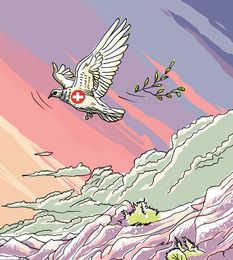Can you stage Hamlet without the Prince of Denmark in it? Or, for that matter, without Claudius?
The phrase “Hamlet without the prince of Denmark” denotes an occasion or event where the principal participant is absent. If you want to be more native and sanskritic, it is like staging Shaakuntalam without Sage Kanva’s foster-daughter in it. Or, without King Dushyanta.
Impossible, we would say. But Swiss President Viola Amherd staged one last week in Bürgenstock.
Let me cut the drama, and explain the farce, as the Swiss opposition have called it. Keen on making the world a better place to live in as most Swiss are, Amherd called a summit that was intended to broker peace between Russia and Ukraine who have been warring for the last two and half years. Coming from the Swiss, known for their mountains, ski-resorts, lakes, watches, army knives, banks, fancily dressed guards in Vatican and their centuries-old neutrality, the initiative carried credibility with most of the world. More than 90 heads of states and governments responded.
Much was riding on the summit. India and most of the Afro-Asian ‘global south’ had hoped that the Swiss would be honest brokers. Sadly, Amherd blotted her neutrality book. She kept Russia out.
In the end, instead of ending the war, the summit ended up prolonging the war. They asked Russia to refrain “from the threat or use of force against the territorial integrity or political independence of any state” and respect “the principles of sovereignty, independence, and territorial integrity of all states, including Ukraine….” There was no word about Russia’s concerns over the eastward expansion of NATO or the hostile military activity close to its borders.
Few had the cheek to call the bluff. India had. “A waste of time,” said Pavan Kapoor, secretary (west) in the Indian foreign office who attended the meeting, but refused to sign the joint communique. “Only those options acceptable to both parties can lead to abiding peace.”
Truth be told, the Swiss are no good at mediation. They might have hosted several of the European peace initiatives since the treaties of Utrecht and Rastatt that ended the wars between France and the Holy Roman Empire, and the Baden treaty of 1714 that ended the war of Spanish succession. In the 20th century they hosted conclaves that led to the Locarno Pact (it is another matter that it was actually signed in a room, still called the Locarno Suite, in the Foreign and Commonwealth Office in London), facilitated the detente between the cold-warring Ronald Reagan and Mikhail Gorbachev and several more. They have been hosting in their cities several of the global institutions like the International Telegraph Union, the Universal Postal Union (1874) and the World Health Organization. Truth be told, the Swiss had little role in those talks, save perhaps in ending the Algerian war in the 1960s, in mediating between Turkey and Armenia in the 21st century which hasn’t yet worked, and a few others. At most other summits, the Swiss have been just providing neutral venues, smart logistics, warm hospitality, fine weather and pretty scenery, leaving the warring parties to talk out the issues.
All the same, let us give credit where it is due. The summit achieved its real purpose.
Real purpose? Wasn’t it peace? Not by a long missile shot. The real purpose was to try and end the Ukraine fatigue that has been infecting most of the European populations and leaders, who have been watching, funding and fuelling a war with no end.
The summit swore them all to doing more for Ukraine.
prasannan@theweek.in


